
Publications
On this page:
Books
- Interaction and Everyday
Life:
Phenomenological and Ethnomethodological Essays in Honor of George Psathas
co-edited with Hisashi Nasu - Lexington Books, 2012
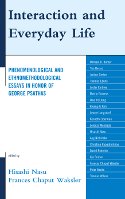
- From back cover: Phenomenological sociology and ethnomethodology have many adherents and practitioners throughout the world. The international character of interest in these two areas is exemplified by the scholars from Canada, France, Germany, Japan, South Korea, Switzerland, and the United States who contributed to this collection. Together they exemplify the kinds of theoretical and research issues that arise in seeking to explore the social world in ways that respect what Edmund Husserl referred to as "the original right" of all data. These chapters were inspired in various ways by the work of George Psathas, professor emeritus of Boston University, a renowned phenomenological sociologist and ethnomethodologist as well as a fundamental contributor to phenomenological sociology and ethnomethodology movements both in the United States and throughout the world. The collection consists of three parts: phenomenological sociology as an intellectual movement, phenomenological considerations, and ethnomethodological explorations, all areas to which Professor Psathas has made significant contributions.
- A phenomenological sociology movement in the US is examined as an intellectual movement in itself and as it is influenced by a leader's participation as both scholar and teacher. Phenomenological sociology's efficacy and potential are discussed in terms of a broad range of theoretical and empirical issues: methodology, similarities and differences between phenomenological sociology and ethnomethodology, embodied sociality, power, trust, friendship, face-to-face interaction, and interactions between children and adults. Theoretical articles addressing fundamental features of ethnomethodology, its development, and its relation to process-relational philosophy are balanced by empirical articles founded on authors' original ethnomethodological research—activities of direction-giving and direction-following, accounts for organizational deviance, garden lessons, doing being friends, and the crafting of musical time. Through these chapters readers can come to understand the theoretical development of phenomenological sociology and ethnomethodology, appreciate their achievements and their promise, and find inspiration to pursue their own work in these areas.
- Contributions by: Christina Papadimitriou; David Rehorick; Hwa Yol Jung; Michael Barber; Lester Embree; Ilja Srubar; Martin Endress; Thomas Eberle; Jochen Dreher; Kwang-ki Kim; Thomas Wilson; Lenore Langsdorf; Kenneth Liberman; Tim Berard; Lorenza Mondada; Aug Nishizaka; Peter Weeks; Hisashi Nasu and Frances Chaput Waksler
- Endorsements
- This book of essays in honor of George Psathas, beyond recognizing and celebrating the teaching and research of this worthy scholar, provides a wide-ranging set of inquiries that span the substantive domains of phenomenological sociology, ethnomethodology, and conversation analysis. Anyone interested in one or more of these domains will not want to miss the inquiries that are assembled in this tome. They are thoughtful, readable, contemporary, and thereby give access to current thinking in the areas that Professor Psathas brought forward for sociological appreciation and to which he mightily contributed.
- Douglas W. Maynard, University of Wisconsin—Madison
- In this book the reader will find the widest range of expressions and positions on phenomenological sociology. Numerous valuable contributions contained in this volume are focused on exploring the interface between phenomenology and ethnomethodology, however its main accomplishment is to illustrate that phenomenological sociology is made by people (men of flesh and blood who live, act and think in the life-world) and that, if it has a meaning and significance for us today, it's because throughout his life and work George Psathas has started and led the way of this intellectual movement.
- Carlos Belvedere, University of Buenos Aires
- Available from: Bloomsbury Publishing
- The New Orleans Sniper:
A Phenomenological Case Study of Constituting the Other - University Press of America, 2010
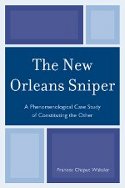
- From back cover:
On January 7, 1973, shots were fired from Howard Johnson's Motel in
New Orleans, LA. Six were killed, ten wounded. After the first
sniper was killed, the search continued for others. A thorough
police investigation, however, concluded that there had been only
one—whose body was found on the motel roof. How did the idea of
multiple snipers emerge? How was it decided that there had been only
one after all? More generally, how does anyone come to a decision
about the existence or nonexistence of another person? In prose both
analytic and engaging, Waksler traces the course of this event and
the claims and counterclaims made in the search to explain it.
- Endorsements
- ...[A] finely detailed and meticulously documented case study...a primer in sociology....Waksler demonstrates the myriad ways in which thinking...is perturbed and ultimately determined by the social setting in which the existence of an Other is open to question. Its subtext raises serious and sobering questions about the reliability of human observation....
- Maxine Sheets-Johnstone, independent scholar and courtesy professor of philosophy, University of Oregon
- ...Demonstrates, empirically, the process of continually constituting, unconstituting, and re-constituting—of persons, places, and things—that is central to Edmund Husserl's phenomenology. The great value...is its application of a philosophical idea to understanding a concrete event: how we sort through the enormous detail of a happening in order to say it is this way rather than that way.
- Lenore Langsdorf, professor emerita, Southern Illinois University
- [Waksler's] honest, careful, and detailed phenomenological analysis to disclose the inner and outer horizons of 'evidence' can be generalized and applied to everyday life. This book leads readers to recognize that we always and already depend on hidden performances and taken-for-granted assumptions....
- Hisashi Nasu, professor of sociology, Waseda University, Tokyo, Japan
- ..A taut and engaging interweaving of philosophical reflection and criminal forensics....[It] challenges the reader to question some of our most basic notions of what it means to encounter another human being. This book will appeal to a wide-ranging audience, including practitioners and academics in philosophy, sociology, psychology, criminal justice, military science, and forensics.
- Jonathan M. Wender, professor, Law, Societies, and Justice Program/Department of Sociology, University of Washington, twenty-year police veteran
- Review: British Journal of Criminology (pdf)
- Available from: Bloomsbury Publishing
- The Little Trials of Childhood and Children's Strategies for Dealing with Them
- London: Falmer Press, 1996
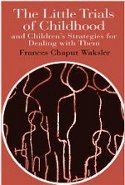
- From back cover:
In this eminently readable book, the author stakes out a surprisingly
neglected area—the troubles and difficulties that children
experience—simply by being children. These experiences may
escape—the notice of adults but for children
constitute—"the little trials of
childhood."
Replete with stories by adults of being a child—not being believed, being left unprotected against monsters, discovering that Santa Claus is not real—the book presents children as they live in the social worlds of adults and in social worlds of their own making. A range of children's strategies for dealing with the "little trials" display children's competence and disclose the subterfuges that they themselves craft or that adults unwittingly teach them
A unique combination of theoretical analysis and fascinating anecdote, with a clarity of prose unusual in sociological writing, The Little Trials of Childhood provides an original perspective on the experience of childhood. With her wit, compassion, and sociological insights, Waksler will engage both scholars and general audiences. - Available from: Routledge, Taylor & Francis Group
- London: Falmer Press, 1991
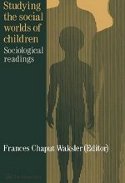
-
From back cover:
A lively and varied set of readings exploring the multi-faceted social
worlds of children, this collection transcends the textbook and will
engage both general audiences and scholars with the breadth of its
insights into children's ways. The editor's incisive and original
introductions to each selection provide a clear and useful framework
for appreciating and understanding the uniqueness of the sociological
approach to studying children.
Although it is particularly appropriate for classroom use for those without a background in sociology, it is suitable for a more general audience interested in looking at children sociologically. A number of important moral issues are raised whose articulation aides understanding and can serve as a basis for implementing change. A respect for children pervades the readings, encouraging teachers to take children seriously as people in their own right. Such an approach is not to be confused with one that pushes children to grow up, or one that suggests that should be treated like adults. Rather it respects children for what they are. Those interested in the practical applications of sociology and in alternative perspectives to current psychological materials will find this book a useful resource. - Available from: Routledge, Taylor & Francis Group
- The Sociology of Deviance: An Introduction
- Boston and Toronto: Little Brown, 1982
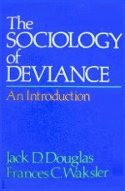
- From publicity materials:
While surveying the field (its origins and development, classic and
recent thought and research) Douglas and Waksler define and
elaaborate "the new perspective," their umbrella term for
a range of current positions and theories, including new symbolic
interactionism, labeling theory, dramaturgy, phenomenology, and
existential sociology. Then, treating this value-neutral "new
perspective" as both an interpretive tool and a unifying
framework, they apply it to diverse types of deviance. . .and use it
to integrate their coverage of theories and data.
The authors offer fresh, provocative treatment of theft, burglary, lying, and white-collar crime, as well as in-depth coverage of sexual deviance, drugs, and violence. They also include a unique chapter on a wholly new subject: cognitive deviance—deviance in thought rather than in action (for example, religious cultism or belief in magic. - Review: JSTOR
- Available used, e.g., AbeBooks
- The Essential Features of Face-to-Face Interaction: A Phenomenological Analysis
- 1973 (unpublished Ph.D. dissertation)
Published Articles
- 2012
- "First Graders in a College Sociology Classroom: A
Reflection." In Qualitative Sociology Review,
Volume VIII Issue 3
download article here (pdf) - 2012
- "Children as Interactional Partners for Adults." In Interaction and Everyday Life: Phenomenological and Ethnomethodological Essays in Honor of George Psathas, Hisashi Nasu and Frances Chaput Waksler (eds.), Lanham, MD: Lexington Books.
see book - 2005
- "Analogues of Ourselves: Who Counts as an Other?" In Human Studies. (28:4).
- 2002
- "On Editing and Human Studies." In Human Studies. (25:4).
- 2001
- "Medicine and the Phenomenological Method." In Handbook for the Philosophy of Medicine, Volume One: Phenomenology and Medicine, S. Kay Toombs (ed.), Dordrecht, The Netherlands: Kluwer, pp. 67-86.
- 1995
- "Introductory Essay: Intersubjectivity as a Practical Matter and a Problematic Achievement." In Human Studies. (18:1).
- 1991
- "Beyond Socialization." In Studying the Social Worlds of Children: Sociological Readings, Frances Chaput Waksler (ed.) Basingstoke, Hampshire, England: Falmer Press.
- 1991
- "The Hard Times of Childhood and Children's Strategies for Dealing with Them." In Studying the Social Worlds of Children: Sociological Readings, Frances Chaput Waksler (ed.) Basingstoke, Hampshire, England: Falmer Press.
- 1989
- "Erving Goffman's Sociology: An Introductory Essay." In Human Studies (12:1-2).
- 1989
- David A. Goode with Frances C. Waksler, "The Missing Who: Situational Identity and Fault-Finding with an Alingual Deaf-Blind Child." In Sociological Studies of Child Development, Volume 3, Nancy Mandell (ed.) CN.: JAI Press.
- 1987
- "Dancing When the Music is Over: A Study of Deviance in a Kindergarten Classroom." In Sociological Studies of Child Development, Volume 2, Peter and Patricia Adler (eds.) CN.: JAI Press, pp. 139-158 and reprinted in Studying the Social Worlds of Children: Sociological Readings, Frances Chaput Waksler (ed.) Basingstoke, Hampshire, England: Falmer Press.
- 1986
- "Studying Children: Phenomenological Insights." Human Studies (9: 71-82) and reprinted in Studying the Social Worlds of Children: Sociological Readings, Frances Chaput Waksler (ed.) Basingstoke, Hampshire, England: Falmer Press.
- 1985
- "Seeing Kids." In For Kids' Sake: Photographs of Today's Youth. Photographic Resource Center, Boston University.
- 1973
- George Psathas and Fran Waksler, "The Essential Features of Face- to-Face Interaction." In Phenomenological Sociology. George Psathas (ed.), NY: Wiley, pp. 159-183.
Papers Presented
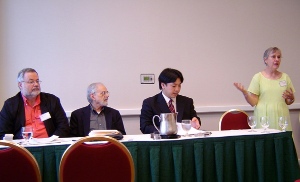
Lester Embree, George Psathas, Ken'ichi Kawano, Frances Waksler
Session at meetings of the Society for Phenomenology and the Human Sciences
photo
by Kyoko Utsunomiya
- 2007
- "Obscuring Children's Lived Experience: Assessing Children by the
Standards of Adulthood"
Society for Phenomenology and the Human Sciences - 2004
- "Constituting An Embodied Other: The Case Of The New Orleans
Sniper"
Keynote Address to the International Human Science Research Conference (St. Catharines, Ontario) - 2003
- "Constituting the Other: The Case of the New Orleans Sniper"
Society for Phenomenology and the Human Sciences - 2001
- "Analogues of Ourselves: A Phenomenological Exploration of Face-to-Face Interaction"
Society for Phenomenology and the Human Sciences - 1999
- "Analogues of Ourselves: A Phenomenological Exploration of Face-to-Face Interaction"
Boston University Sociology Department Graduate Colloquium - 1999
- "Children as Interactional Partners for Adults"
Eastern Sociological Society - 1996
- "The Little Trials of Childhood"
Cambridge Public Library, O'Neill Branch - 1996
- "Children's Property"
Society for the Study of Social Problems - 1996
- "The Family As a Social Problem"
Eastern Sociological Society - 1995
- Invited paper. "Feminism OR Children: Children's Perspectives"
American Sociological Association - 1995
- "The Social Construction of Non-Reality: The Case of Santa Claus"
Eastern Sociological Society - 1994
- "Adults' Control of Children's Bodies"
Eastern Sociological Society - 1993
- "Adults' Clothes and Adults' Jokes: Adults as Sources of Children's
Embarrassment"
Society for Phenomenology and the Human Sciences - 1993
- "Lying to Children"
Eastern Sociological Society - 1992
- "The Hard Times of Childhood: Matters of Truth"
The Colloquium for Graduate Sociology, Boston University Department of Sociology - 1992
- "The Unpredictable Nature of the 'I' in the Thought of George
Herbert Mead."
Eastern Sociological Society - 1991
- "The Self in Time: Some Continuities in the Works of Edmund
Husserl and George Herbert Mead."
Society for Phenomenology and the Human Sciences - 1991
- "Disembodied Evidence: The Social Significance of Inanimate
Phenomena"
Eastern Sociological Society - 1990
- "The Hard Times of Childhood"
Eastern Sociological Society - 1986
- "Dancing When the Music is Over: A Study of Deviance in a
Kindergarten Classroom"
American Sociological Association - 1984
- "Studying Children: Phenomenological Insights"
Eastern Sociological Society - 1979
- "Analyzing the Initiation of Interaction: Case Study of a Failure"
Eastern Sociological Society - 1974
- "The Identification of a Phenomenon: Working Paper in
Phenomenological Sociology"
Society for Phenomenology and Existential Philosophy - 1972
- "Sociology and Regions of Knowledge"
Eastern Sociological Society - 1971
- "A Place to Stand: Perspective in Sociology"
Eastern Sociological Society - 1970
- "Is the Concept of 'Family' Useful?"
Eastern Sociological Society